- Home
- Franz Kafka
The Diaries of Franz Kafka Page 38
The Diaries of Franz Kafka Read online
Page 38
I had agreed to go picknicking on Sunday with two friends, but quite unexpectedly slept past the hour when we were to meet. My friends, who knew how punctual I ordinarily am, were surprised, came to the house where I lived, waited outside awhile, then came upstairs and knocked on my door. I was very startled, jumped out of bed, and thought only of getting ready as soon as I could. When I emerged fully dressed from my room, my friends fell back in manifest alarm. ‘What’s that behind your head?’ they cried. Since my awakening I had felt something preventing me from bending back my head, and I now groped for it with my hand. My friends, who had grown somewhat calmer, had just shouted ‘Be careful, don’t hurt yourself!’ when my hand closed behind my head on the hilt of a sword. My friends came closer, examined me, led me back to the mirror in my room, and stripped me to the waist. A large, ancient knight’s sword with a cross-shaped handle was buried to the hilt in my back, but the blade had been driven with such incredible precision between my skin and flesh that it had caused no injury. Nor was there a wound at the spot on my neck where the sword had penetrated; my friends assured me that there was an opening large enough to admit the blade, but dry and showing no trace of blood. And when my friends now stood on chairs and slowly, inch by inch, drew out the sword, I did not bleed, and the opening on my neck closed until no mark was left save a scarcely discernible slit. ‘Here is your sword,’ laughed my friends, and gave it to me. I hefted it in my two hands; it was a splendid weapon, Crusaders might have used it.
Who tolerates this gadding about of ancient knights in dreams, irresponsibly brandishing their swords, stabbing innocent sleepers who are saved from serious injury only because the weapons in all likelihood glance off living bodies, and also because there are faithful friends knocking at the door, prepared to come to their assistance?
20 January. The end of writing. When will it catch me up again? In what a bad state I am going to meet F.! The clumsy thinking that immediately appears when I give up my writing, my inability to prepare for the meeting; whereas last week I could hardly shake off all the ideas it aroused in me. May I enjoy the only conceivable profit I can have from it – better sleep.
Black Flags. How badly I even read. And with what malice and weakness I observe myself. Apparently I cannot force my way into the world, but lie quietly, receive, spread out within me what I have received, and then step calmly forth.
24 January. With F. in Bodenbach. I think it is impossible for us ever to unite, but dare say so neither to her nor, at the decisive moment, to myself. Thus I have held out hope to her again, stupidly, for every day makes me older and crustier. My old headaches return when I try to comprehend that she is suffering and is at the same time calm and gay. We shouldn’t torment each other again by a lot of writing, it would be best to pass over this meeting as a solitary occurrence; or is it that I believe I shall win freedom here, live by my writing, go abroad or no matter where, and live there secretly with F.?
We have found each other quite unchanged in other ways as well. Each of us silently says to himself that the other is immovable and merciless. I yield not a particle of my demand for a fantastic life arranged solely in the interest of my work; she, indifferent to every mute request, wants the average: a comfortable home, an interest on my part in the factory, good food, bed at eleven, central heating; sets my watch – which for the past three months has been an hour and a half fast – right to the minute. And she is right in the end and would continue to be right in the end; she is right when she corrects the bad German I used to the waiter, and I can put nothing right when she speaks of the ‘personal touch’ (it cannot be said any way but gratingly) in the furnishings she intends to have in her home. She calls my two elder sisters ‘shallow’, she doesn’t ask after the youngest at all, she asks almost no questions about my work and has no apparent understanding of it. That is one side of the matter.
I am as incompetent and dreary as always and should really have no time to reflect on anything else but the question of how it happens that anyone has the slightest desire even to crook her little finger at me. In rapid succession I have blown upon three different kinds of people with this cold breath. The people from Hellerau, the R. family in Bodenbach, and F. F. said, ‘How well behaved we’ve been.’ I am silent as if my hearing had suddenly failed me during this exclamation. We were alone two hours in the room. Round about me only boredom and despair. We haven’t yet had a single good moment together during which I could have breathed freely. With F. I never experienced (except in letters) that sweetness one experiences in a relationship with a woman one loves, such as I had in Zuckmantel and Riva – only unlimited admiration, humility, sympathy, despair, and self-contempt. I also read aloud to her, the sentences proceeded in a disgusting confusion, with no relationship to the listener, who lay on the sofa with closed eyes and silently received them. A lukewarm request to be permitted to take a manuscript along and copy it. During the reading of the door-keeper story, greater attention and good observation. The significance of the story dawned upon me for the first time; she grasped it rightly too, then of course we barged into it with coarse remarks; I began it.
The difficulties (which other people surely find incredible) I have in speaking to people arise from the fact that my thinking, or rather the content of my consciousness, is entirely nebulous, that I remain undisturbed by this, so far as it concerns only myself, and am even occasionally self-satisfied; yet conversation with people demands pointedness, solidity, and sustained coherence, qualities not to be found in me. No one will want to lie in clouds of mist with me, and even if someone did, I couldn’t expel the mist from my head; when two people come together it dissolves of itself and is nothing.
F. goes far out of her way to come to Bodenbach, goes to the trouble of getting herself a passport, after a night spent in sitting up must bear with me, must even listen to me read aloud, and all of it senseless. Does she feel it to be the same sort of calamity I do? Certainly not, even assuming the same degree of sensitivity. After all, she has no sense of guilt.
What I said was true and was acknowledged to be true: each loves the other person as he is. But doesn’t think it possible to live with him as he is.
The group here: Dr W. tries to convince me that F. deserves to be hated, F. tries to convince me that W. deserves to be hated. I believe them both and love them both, or try to.
29 January. Again tried to write, virtually useless. The past two days went early to bed, about ten o’clock, something I haven’t done for a long time now. Free feeling during the day, partial satisfaction, more useful in the office, possible to speak to people – Severe pain in my knee now.
30 January. The old incapacity. Hardly ten days interrupted in my writing and already cast aside. Once again prodigious efforts stand before me. You have to dive down, as it were, and sink more rapidly than that which sinks in advance of you.
7 February. Complete standstill. Unending torments.
At a certain point in self-knowledge, when other circumstances favouring self-security are present, it will invariably follow that you find yourself execrable. Every moral standard – however opinions may differ on it – will seem too high. You will see that you are nothing but a rat’s nest of miserable dissimulations. The most trifling of your acts will not be untainted by these dissimulations. These dissimulated intentions are so squalid that in the course of your self-scrutiny you will not want to ponder them closely but will instead be content to gaze at them from afar. These intentions aren’t all compounded merely of selfishness, selfishness seems in comparison an ideal of the good and beautiful. The filth you will find exists for its own sake; you will recognize that you came dripping into the world with this burden and will depart unrecognizable again – or only too recognizable – because of it. This filth is the nethermost depth you will find; at the nethermost depth there will be not lava, no, but filth. It is the nethermost and the uppermost, and even the doubts self-scrutiny begets will soon grow weak and self-complacent as the wallowing of a
pig in muck.
9 February. Wrote a little today and yesterday. Dog story.93
Just now read the beginning. It is. ugly and gives me a headache. In spite of all its truth it is wicked, pedantic, mechanical, a fish barely breathing on a sandbank. I write my Bouvard et Pécuchet prematurely. If the two elements – most pronounced in ‘The Stoker’ and ‘In the Penal Colony’ – do not combine, I am finished. But is there any prospect of their combining?
Finally took a room. In the same house on Bilekgasse.
10 February. First evening. My neighbour talks for hours with the landlady. Both speak softly, the landlady almost inaudibly, and therefore so much the worse. My writing, which has been coming along for the past two days, is interrupted, who knows for how long a time? Absolute despair. Is it like this in every house? Does such ridiculous and absolutely killing misery await me with every landlady in every city? My class president’s two rooms in the monastery. It is senseless, however, to give way at once to despair; rather seek some means, much as – no, it is not contrary to my character, there is still some tough Jewishness in me, but for the most part it helps the other side.
14 February. The infinite attraction of Russia. It is best represented not by a troika but by the image of a vast river of yellowish water on which waves – but not too high ones – are everywhere tossing. Wild, desolate heaths upon its banks, blighted grass. But nothing can represent it; everything rather effaces it.
Saint-Simonism.
15 February. Everything at a halt. Bad, irregular schedule. This house spoils everything for me. Today again heard the landlady’s daughter at her French lesson.
16 February. Can’t see my way clear. As though everything I possessed had escaped me, and as though it would hardly satisfy me if it all returned.
22 February. Incapable in every respect, and completely so.
25 February. After days of uninterrupted headaches, finally a little easier and more confident. If I were another person observing myself and the course of my life, I should be compelled to say that it must all end unavailingly, be consumed in incessant doubt, creative only in its self-torment. But, an interested party, I go on hoping.
1 March. By a great effort, after weeks of preparation and anxiety, gave notice; not entirely with reason, it is quiet enough, but I simply haven’t done any good work yet and so haven’t sufficiently tested either the quiet or the lack of it. I gave notice rather because of the lack of quiet in me. I want to torment myself, want continually to change my situation, believe I foresee my salvation in the change and in addition believe that by such petty changes, which others make while they doze but I make only after having roused up all my faculties, I shall be able to ready myself for the great change that I probably need. I am certainly changing for a room inferior in many ways. Nevertheless, today was the first (or the second) day on which I should have been able to work well, had I not had a very severe headache. Have written a page in haste.
11 March. How time flies; another ten days and I have achieved nothing. It doesn’t come off. A page now and then is successful, but I can’t keep it up, the next day I am powerless.
Eastern and Western Jews, a meeting.94 The Eastern Jews’ contempt for the Jews here. Justification for this contempt. The way the Eastern Jews know the reason for their contempt, but the Western Jews do not. For example, the appalling notions, beyond all ridicule, by which Mother tries to comprehend them. Even Max, the inadequacy and feebleness of his speech, unbuttoning and buttoning his jacket. And after all, he is full of the best good will. In contrast a certain W., buttoned into a shabby little jacket, a collar that it would have been impossible to make filthier worn as his holiday best, braying yes and no, yes and no. A diabolically unpleasant smile around his mouth, wrinkles in his young face, wild and embarrassed movements of his arms. But the best one is a little fellow, a walking argument, with a sharp voice impossible to modulate, one hand in his pocket, boring towards the listeners with the other, constantly asking questions and immediately proving what he sets out to prove. Canary voice. Tosses his head. I, as if made of wood, a clothes-rack pushed into the middle of the room. And yet hope.
13 March. An evening. At six o’clock lay down on the sofa. Slept until about eight. Couldn’t get up, waited for the clock to strike, and in my sleepiness missed hearing it. Got up at nine o’clock. Didn’t go home for supper, nor to Max’s either, where there was a gathering tonight. Reasons: lack of appetite, fear of getting back late in the evening; but above all the thought that I wrote nothing yesterday, that I keep getting farther and farther from it, and am in danger of losing everything I have laboriously achieved these past six months. Provided proof of this by writing one and a half wretched pages of a new story that I have already decided to discard and then in despair, part of the blame for which my listless stomach certainly shares, read Herzen in the hope that he might somehow carry me on. His happiness the first year after he was married, my horror of seeing myself in a similar happy state; the high life around him; Belinski; Bakunin in bed all day long with his fur coat on.
Occasionally I feel an unhappiness which almost dismembers me, and at the same time am convinced of its necessity and of the existence of a goal to which one makes one’s way by undergoing every kind of unhappiness (am now influenced by my recollection of Herzen, but the thought occurs on other occasions too).
14 March. A morning: In bed until half past eleven. Jumble of thoughts which slowly takes shape and hardens in an incredible fashion. Read in the afternoon (Gogol, essay on the lyric), in the evening a walk, part of the time the defensible but untrustworthy ideas of the morning in my head. Was in Chotek Park. Most beautiful spot in Prague. Birds sang, the Castle with its arcade, the old trees hung with last year’s foliage, the dim light. Later Ottla arrived with D.
17 March. Harassed by noise. A beautiful, much more friendly room than the one on Bilekgasse. I am so dependent on the view; there is a beautiful one here, the Teinkirche. But a great deal of noise from the carriages down below; however, I am growing quite used to it. But impossible for me to grow used to the noise in the afternoon. From time to time a crash in the kitchen or the corridor. Yesterday, in the attic above, perpetual rolling of a ball, as if someone for some incomprehensible reason were bowling, then a piano below me in addition. Yesterday evening a relative silence, worked somewhat hopefully (‘Assistant Attorney’), today began with joy, suddenly, next door or below me, a party taking place, loud and fluctuating as though I were in its midst. Contended with the noise awhile, then lay on the sofa with nerves virtually shattered, silence aften ten o’clock, but can’t work any longer.
23 March. Incapable of writing a line. The feeling of ease with which I sat in Chotek Park yesterday and on the Karlsplatz today with Strindberg’s By the Open Sea. My feeling of ease in my room today. Hollow as a clam-shell on the beach, ready to be pulverized by the tread of a foot.
25 March. Yesterday Max’s lecture, ‘Religion and Nation’. Talmudic Eastern Jews. The girl from Lemberg. The Western Jew who has become assimilated to the Hasidim, the plug of cotton in his ear. Steidler, a Socialist, long, shining, neatly cut hair. The delight with which the Eastern European Jewesses take sides. The group of Eastern Jews beside the stove. G. in a caftan, the matter-of-fact Jewish life. My confusion.
9 April. Torments of my apartment. Boundless. Worked well a few evenings. If I had been able to work at night! Today kept from sleep, from work, from everything by the noise.
14 April. The Homer class for the Galician girls. The one in the green blouse, sharp, severe face; when she raised her hand she held it straight out in front of her; quick movements when she put on her coat; if she raised her hand and was not called on, she felt ashamed and turned her face aside. The sturdy young girl in green at the sewing-machine.
27 April. In Nagy Mihály with my sister.95 Incapable of living with people, of speaking. Complete immersion in myself, thinking of myself. Apathetic, witless, fearful. I have nothing to say to anyone – never.
Trip to Vienna. The much-travelled, all-knowing, all-judging Viennese, tall, blond-bearded, legs crossed, was reading Az Est; obliging, yet, as Elli and I (both of us equally on the watch) noted, reserved. I said, ‘How much you must have travelled!’ (He knew all the train connexions I needed – as it turned out later, however, the particulars weren’t entirely correct – knew all the tram routes in Vienna, advised how to telephone in Budapest, knew what the baggage arrangements were, knew that it was cheaper to take a taxi with your luggage.) He made no reply to this but sat motionless with bowed head. The girl from Žižkov, sentimental, talkative but seldom able to make herself heard, a poor, anaemic, undeveloped body no longer able to develop. The old woman from Dresden with a face like Bismarck’s, let it be known later that she was a Viennese. The fat Viennese woman, wife of one of the editors of Die Zeit; knew all about newspapers, spoke clearly; to my extreme disgust usually expressed the very opinions I hold. I for the most part silent, had nothing to say; among such people the war doesn’t call forth in me the slightest opinion worth expressing.
Vienna-Budapest. The two Poles, the lieutenant and the lady, soon got off, whispered at the window; she was pale, not quite young, almost hollow-cheeked, her hands often on her tight-skirted hips, smoked a great deal. The two Hungarian Jews; the one at the window, who resembles Bergmann, cushioned the head of the other, who was asleep, on his shoulder. Throughout the morning, from five on, talk about business, accounts and letters passing from hand to hand, samples of every kind of article were taken out of a handbag. Across from me a Hungarian lieutenant, in sleep a vacant, ugly face, open mouth, funny nose; earlier, when he had been describing Budapest, full of animation, bright-eyed; lively voice into which his whole personality entered. Near by in the compartment the Jews from Bistritz who were returning home. A man was accompanying several women. They learned that Körös Mesö had just been closed to civilians. They will have to travel twenty hours or more by car. They told a story of a man who stayed in Radautz until the Russians were so close that it was impossible for him to escape except by climbing on to the last Austrian piece of cannon that went through.

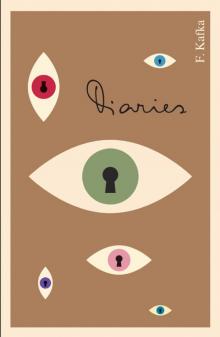 Diaries of Franz Kafka
Diaries of Franz Kafka Metamorphosis and Other Stories
Metamorphosis and Other Stories The Castle: A New Translation Based on the Restored Text
The Castle: A New Translation Based on the Restored Text The Complete Stories
The Complete Stories In the Penal Colony
In the Penal Colony The Trial
The Trial Amerika
Amerika The Burrow: Posthumously Published Short Fiction
The Burrow: Posthumously Published Short Fiction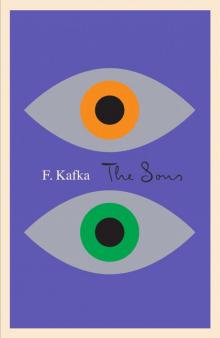 Sons
Sons Letters to Milena
Letters to Milena Investigations of a Dog: And Other Creatures
Investigations of a Dog: And Other Creatures Collected Stories
Collected Stories The Great Wall of China
The Great Wall of China The Burrow
The Burrow The Castle
The Castle The Meowmorphosis
The Meowmorphosis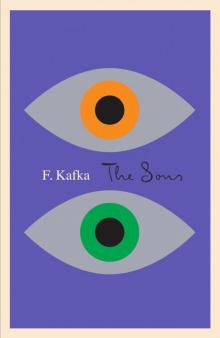 The Sons
The Sons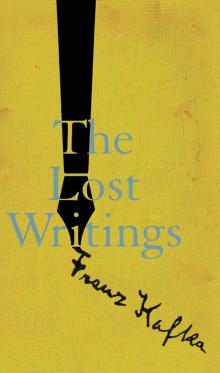 The Lost Writings
The Lost Writings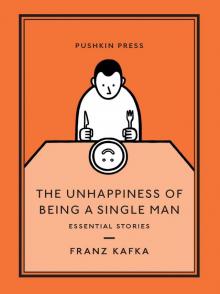 The Unhappiness of Being a Single Man
The Unhappiness of Being a Single Man Amerika: The Missing Person: A New Translation, Based on the Restored Text
Amerika: The Missing Person: A New Translation, Based on the Restored Text The Burrow: Posthumously Published Short Fiction (Penguin Modern Classics)
The Burrow: Posthumously Published Short Fiction (Penguin Modern Classics)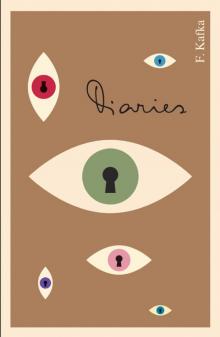 The Diaries of Franz Kafka
The Diaries of Franz Kafka Investigations of a Dog
Investigations of a Dog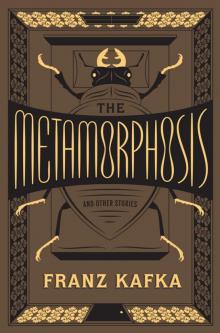 The Metamorphosis and Other Stories
The Metamorphosis and Other Stories The Trial: A New Translation Based on the Restored Text
The Trial: A New Translation Based on the Restored Text